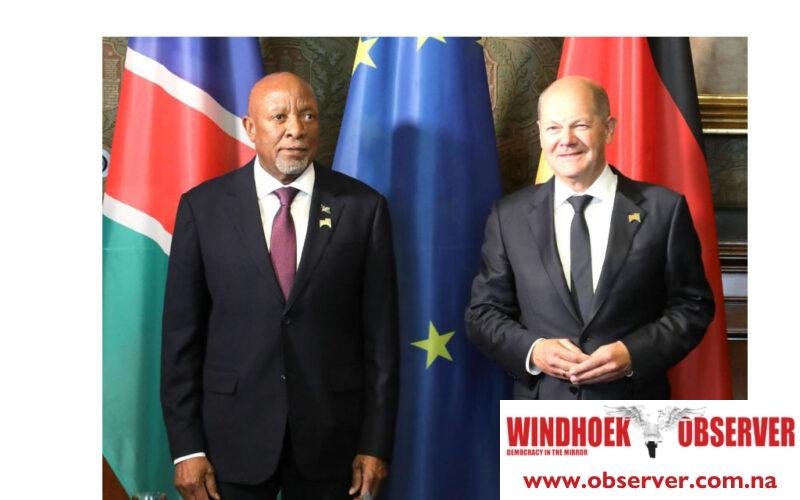Niël Terblanché
President Nangolo Mbumba called for the reform of the global financial architecture to better serve the interests of the Global South while participating in the Hamburg Sustainability Conference.
At the conference, Mbumba and German Chancellor, Olaf Scholz held high-level bilateral talks where both reaffirmed the deepening relationship between the two nations.
The discussions between the two heads of state covered a broad range of topics central to both Namibia’s domestic agenda and global efforts to address critical issues, including Namibia-Germany relations, green hydrogen development, and the ongoing drought in Namibia.
Namibia’s devastating drought was another key topic.
Mbumba outlined the dire situation, explaining that the drought has significantly impacted agricultural output, placing strain on both livelihoods and food security.
In a plea for international support, he called on Germany and other global partners to provide assistance to help Namibia manage the crisis.
He assured Scholz that the Namibian government works tirelessly to mitigate the effects of climate change, an issue that is especially urgent for countries where droughts and environmental degradation threaten both economic stability and human welfare.
One of the most promising areas of cooperation between Namibia and Germany lies in the development of green hydrogen, which was a central focus of their discussions.
Mbumba reiterated Namibia’s ambition to become a global leader in exporting green hydrogen, highlighting key projects such as the Hyphen Hydrogen Project, which aims to produce 2 million tons of green ammonia annually, potentially abating 3 million tons of CO2 emissions.
Mbumba pointed to the strategic importance of this green energy initiative, not only for Namibia’s economic growth but also for global decarbonization efforts.
“Affordable electricity and water are basic ingredients for the development of any nation, and Namibia is no exception,” he said while emphasizing how the project would help Namibia meet its own energy needs while contributing to global climate goals.
He added that the partnership with Germany includes plans to expand Namibia’s maritime infrastructure, positioning the port of Walvis Bay as a future global shipping hub.
“This initiative is a direct reflection of how global partnerships are key to the successful implementation of sustainable development projects,” he said.
Mbumba also announced that Namibian private sector players, in collaboration with a Belgian shipping company, are set to begin constructing an ammonia bunkering hub by early 2025.
He assured the German leader that this facility will enhance Namibia’s capacity to export green hydrogen and its derivatives to Germany and other international markets.
Mbumba praised Germany for convening an inclusive dialogue on sustainable development and added that platforms such as the Hamburg conference are vital to turning the momentum from the recent UN Summit of the Future into concrete action.
He also stressed the need for the reform of the global financial architecture to better serve the interests of the countries of the Global South.
“We need platforms of this nature to entrench the path of hope. The fight against climate change, the eradication of poverty, and the responsible use of digital technologies as key to achieving the Sustainable Development Goals (SDGs),” he said.
Mbumba also stressed the enduring importance of addressing Namibia’s colonial past, specifically the genocide of the Herero and Nama peoples during Germany’s colonial rule in the early 20th century.
He called on Germany to ensure that ongoing negotiations over the Joint Declaration on Genocide, Apology, and Reparations adequately reflect the concerns of the affected communities.
He said that these negotiations, long in progress, have the potential to bring closure to a painful chapter in the shared history of the two nations.
“The frequency of high-level meetings between our nations is a testament to the trust and commitment both sides share,” Mbumba said while stressing the importance of resolving the genocide question to foster reconciliation and move forward in a spirit of mutual respect.




